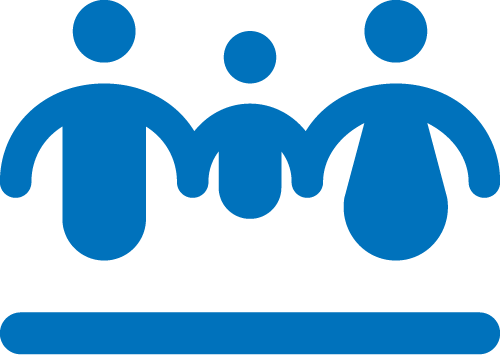
Where can I get help in bringing my family to Australia?
A lawyer is best placed to help you understand the most suitable pathway to bring your family to Australia and can support you with the visa application.
Free legal services that specialise in refugee and migration law are available across Australia. You can find a list of these services on our Help Page.
Migration agents can also help. Please note that these agents usually charge fees. You can find a list of registered agents on the MARA website.
What are the visa options for bringing my family to Australia?
1. Refugee and Humanitarian Visa (Class XB)
Who can apply?
Refugees previously resettled to Australia or others who have been granted permanent protection can apply for their family to be reunited with them in Australia through Australia’s Offshore Humanitarian Program. More detailed information about this program is available in a factsheet on Refugee Advice and Casework Service (RACS) website.
Please note that refugees who arrived in Australia by sea without a visa on or after 13 August 2012 are not eligible to propose family members under the Humanitarian Program. This applies to both adults and children, and there are no exceptions to this policy.
What is Australia’s family reunification program?
There are three main categories under Australia’s family reunification program.
- Split Family Provisions: for proposing ‘immediate’ family members.
- Global Special Humanitarian Program: for proposing both ‘close’ and ‘extended’ family members.
- Community Support Program: for communities, businesses, families and individuals to sponsor applicants with job prospects and support them in settling in Australia. Please note that there are costs involved with this option.
How long does it take for a visa to be processed?
There are limited numbers of visas available for refugees each year in Australia and the demand for family reunification under this program is very high. It is possible that there will be significant delays in processing times.
How many visas are available?
The Australian Government allocates a maximum number of Refugee and Humanitarian visas that can be granted each year. Currently, there are 20,000 visas allocated for each program year.
Where can I find more information?
Read more information on Refugee and Humanitarian Visas on the Department of Home Affairs website.
Read more information about how different parts of Australia’s humanitarian program work on the Refugee and Advice Casework (RACS) website.
2. Regular Migration Streams
Who can apply?
Refugees can also sponsor family members through regular Migration Programs (outside the Humanitarian Program). An example of a visa in this stream is a partner visa and child visa.
How does it work and how long does it take?
Applying for this visa will cost money. However, there may be more spaces available for Regular Migration Programs than the Special Humanitarian Program. Please note that there can also be long delays in processing times for this option.
Where can I find more information?
More information on visa options for joining family in Australia can be found on the Department of Home Affairs website.
Can members of my family be resettled by UNHCR?
If you require more information about whether your family may be eligible for resettlement to Australia, please contact the UNHCR office in your family’s country of asylum. Contact details for the relevant UNHCR office can be found on this page.
It is important to note that resettlement is a very limited durable solution available to a small number of refugees globally. This is due to the number of quota places offered by resettlement countries.
How can UNHCR in Australia help me with the family reunification process?
UNHCR in Australia may be able to assist with family reunification by:
- Helping you obtain proof of registration for family members who are or were registered with UNHCR
- Raising cases involving children or family members who need additional protection to UNHCR colleagues in the relevant country
- Contacting UNHCR colleagues in the field if issues arise, such as problems with DNA testing or obtaining travel documents
